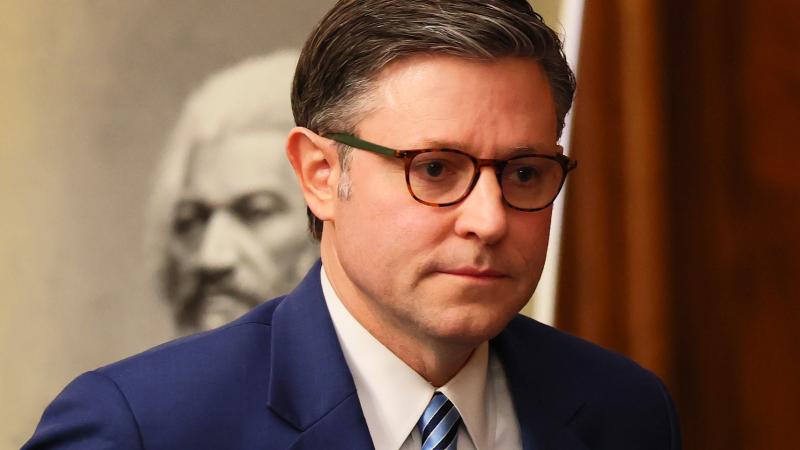House conservatives press for $120 billion in spending cuts, watchdogs already have wish list
Federal funding runs out after Sept. 30. The conservative House Freedom Caucus has proposed reverting to domestic spending levels of $1.47 trillion, which would come in at about $120 billion less than the debt ceiling agreement that President Biden and House Speaker Kevin McCarthy previously reached.
House conservatives are continuing their push for domestic spending cuts of $120 billion as part of the appropriations bill that Congress must pass before Sept. 30 to avoid a government shutdown.
The conservative House Freedom Caucus has proposed reverting to domestic spending levels of $1.47 trillion, which would come in at about $120 billion less than the debt ceiling agreement that President Biden and House Speaker Kevin McCarthy previously reached.
The budget watchdog group, OpenTheBooks.com says it has identified a series of areas the House GOP could find taxpayer savings.
The U.S. government has estimated that there has been about $3 trillion of improper payments made across a host of federal programs since 2004. In 2022, the total was $247 billion. OpenTheBooks.com estimates that the 2022 total to be about $20.5 billion per month or more than $675 million each day.
"If the government could simply revert back to pre-COVID levels of mistaken payments, which average $150 billion since 2004, we would save $97 billion versus 2022," according to the group's analysis. "Concurrently, if President Biden set a similar goal as President Obama and aimed to reduce average annual improper payments by $50 billion, it would be a massive savings for taxpayers."
The watchdog group also said public relations staff across the federal government is costing taxpayers hundreds of millions of dollars. "During FY2022, the federal government employed 4,194 public affairs staffers across all departments. That’s more than one for every county in the United States (3,143)," read the analysis. "At the EPA alone, an agency frequently critiqued for overreach, there are 222 public affairs professionals. What does all this cost? $382,000,871 in base salary and $457,874,795 in adjusted salary."
Returning to a ban on earmarks could result in substantial savings as well, according to the organization's estimates. The FY2023 omnibus bill that passed last December contained about 7,500 earmarks worth $16 billion.
"Overall, Democrats earmarked $9.1 billion, Republicans earmarked $6.4 billion, and bipartisan groups of legislators earmarked an additional $476 million," their analysis showed.
Another area where savings could be found is federal workers with unpaid taxes, which some estimates put as high as $1.5 billion.
OpenTheBooks.com also reported that the U.S. Treasury Inspector General for Tax Administration found that the amount of "delinquent Federal civilian employees has increased by 32 percent from Fiscal Years (FY) 2015 to 2021.” In the past, Republican legislators proposed bills requiring federal workers to pay their taxes or face removal but Congress has not acted on the legislation.
Some federal agencies are still grappling with the issue of duplicative payments.
Under the debt ceiling negotiations of 2010, then Sen. Tom Coburn (R-Ok.) was able secure a provision that required the Government Accountability Office (GAO) to find and report duplicative spending to the Congress.
"In June 2023, GAO reported savings of $46.8 billion from duplicative spending that was found and eliminated. Staying committed to the Coburn rule in future budgets will ensure some baseline savings for years to come, even in they may pale in comparison to overall waste," according to the watchdog group.
The group also said spending on law enforcement practices of certain federal agencies is an area that Congress could trim in the federal budget. They noted that the Internal Revenue Service has spent millions on law enforcement gear since 2006 and other agencies such as Veterans Affairs and the Environmental Protection Agency "engage in law enforcement or protection activities."
In June of this year, Sen. Joni Ernst (R-La.) released a report stating that the Internal Revenue Service alone has spent $35.2 million on guns, ammunition, and military-style equipment since 2006, including $10 million in weaponry and gear since 2020.
House Speaker Kevin McCarthy needs the support of House conservatives to move an appropriations bill across the finish line in the House unless he relies on votes from moderate Democrats. He made progress on that front Tuesday evening, when House Republicans advanced four different appropriations bills, though conservatives in the lower house have expressed concern about the current form of those bills.
Rep. Matt Gaetz (R-Fl.) has said conservatives are committing to securing spending reductions despite the Sept. 30 deadline fast approaching.
"If the departments of Labor and Education have to shut down for a few days as we get their appropriations in line, that's certainly not something that is optimal but I think it's better than continuing on the current path," he said.
Gaetz also said he would take a pay cut if the shutdown occurs.
“It is my understanding that pursuant to the Constitution, members of Congress will continue to receive their pay during a lapse in appropriations,” Gaetz wrote in a letter to House Chief Administration Officer Catherine Szpindor on Monday. “Therefore, I am requesting that in the case of a lapse of appropriations beginning at 12:00 a.m. on October 1, 2023, my pay be withheld until legislation has taken effect to end such lapse in appropriations in its entirety.”
The Facts Inside Our Reporter's Notebook
Links
- OpenTheBooks.com
- reverting to domestic spending levels of $1.47 trillion
- debt ceiling agreement
- Sen. Joni Ernst (R-Ia.) released a report
- Internal Revenue Service alone has spent $35.2 million
- Gaetz wrote in a letter















